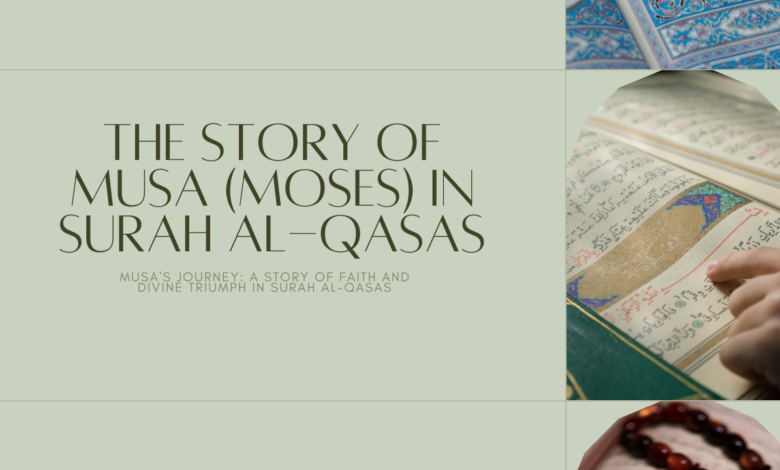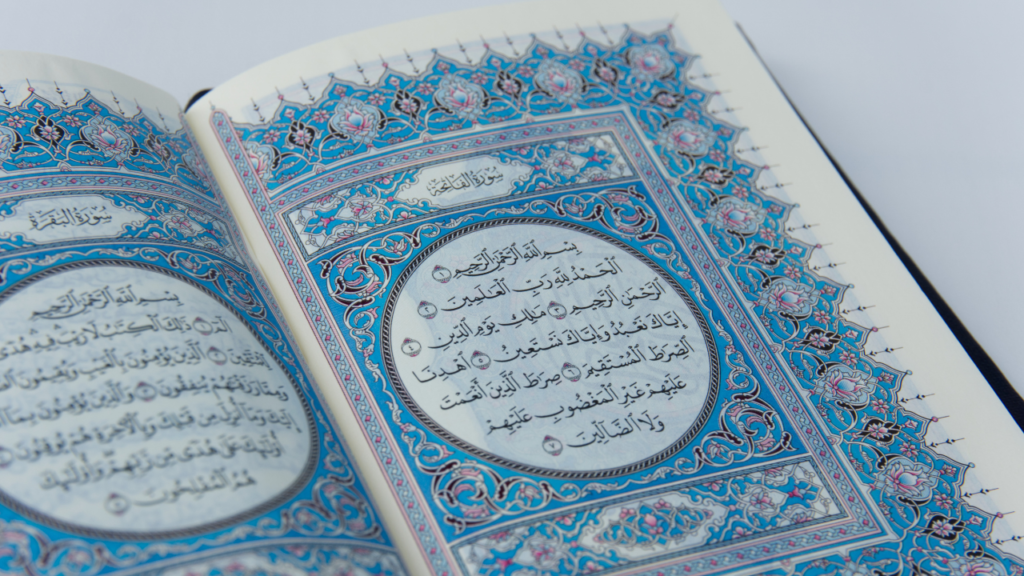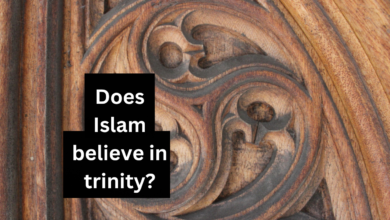The Story of Musa (Moses) in Surah Al-Qasas
Musa's Journey: A Story of Faith and Divine Triumph in Surah Al-Qasas

The Story of Musa (Moses) in Surah Al-Qasas
Surah Al-Qasas is the 28th chapter of the Quran, and it contains stories and lessons from the past, including the story of Musa (Moses).

Introduction
The story of Musa (Moses) is one of the most prominent and revered narratives in the Quran. It is a timeless tale of faith, resilience, and divine intervention, teaching profound lessons about trust in God’s plan, standing up against oppression, and the strength that arises from unwavering belief. Surah Al-Qasas, the 28th chapter of the Quran, beautifully recounts the events in the life of Musa and the Israelites, illustrating the deep and complex relationship between a prophet and his people.
A Divine Promise
Surah Al-Qasas begins with a powerful reminder of Allah’s promise to protect and guide His messengers. “And We inspired to the mother of Moses, ‘Suckle him; but when you fear for him, cast him into the river and do not fear and do not grieve. Indeed, We will return him to you and will make him [one] of the messengers.'” (Quran 28:7)
Musa’s mother, in a display of extraordinary faith, follows this divine guidance, placing her infant son in a basket and setting it adrift in the river. This act of trust sets in motion a sequence of events that would eventually lead Musa to his prophetic mission.
The Education of Musa
The basket carrying the infant Musa is discovered by the Pharaoh’s family and brought to the palace. Intriguingly, Musa’s sister keeps a watchful eye on her brother’s fate, eventually facilitating his reunion with his mother and the fulfillment of Allah’s promise. Musa’s upbringing in the palace of the very ruler who oppressed the Israelites provides a unique perspective on power and privilege.
Musa’s Divine Call
As Musa grows, he inadvertently kills an Egyptian who was oppressing an Israelite. Fearing retribution, he flees to the land of Midian, where he encounters a group of young women who are struggling to water their flocks due to the presence of men. Musa helps them, exemplifying his commitment to justice and kindness.
It is during this period of his life, at the age of 40, that Musa receives his divine call. While tending to his flock, he encounters a burning bush that speaks to him. This miraculous event is a direct revelation from Allah, instructing Musa to return to Egypt as a messenger of God and to confront Pharaoh’s oppression.
The Confrontation with Pharaoh
Musa returns to Egypt and, with his brother Harun (Aaron) as his supporter and interpreter, delivers Allah’s message to Pharaoh. The confrontation is filled with signs and miracles, as Musa’s staff is transformed into a serpent, and his hand radiates with divine light. Despite witnessing these miracles, Pharaoh remains obstinate in his tyranny.
The Ten Plagues
The conflict between Musa and Pharaoh escalates, leading to a series of ten plagues that afflict Egypt. These plagues, including the Nile turning to blood, locusts, and darkness, are sent as a sign from Allah to guide Pharaoh and his people towards the truth. However, Pharaoh’s arrogance and stubbornness lead him to reject the divine signs and continue his oppression of the Israelites.
The Exodus
The culmination of the story of Musa in Surah Al-Qasas is the miraculous crossing of the Red Sea, known as the Exodus. As Pharaoh and his army pursue the Israelites, they find themselves trapped between the sea and Musa’s followers. In an incredible display of divine intervention, Allah commands Musa to strike the sea with his staff, causing it to part, allowing the Israelites to cross safely. But when Pharaoh and his army attempt to follow, the waters return, drowning them and ending their tyranny.
Conclusion
The story of Musa in Surah Al-Qasas is a testament to the power of faith, the unwavering commitment to justice, and the divine assistance granted to those who trust in Allah’s plan. Musa’s journey from infancy in the river to the confrontation with Pharaoh and the miraculous crossing of the Red Sea is a story that continues to inspire and guide people of all faiths.
This narrative encapsulates the Quran’s timeless message, teaching us that even in the face of seemingly insurmountable challenges and oppression, faith in Allah and the courage to stand up for what is right can lead to divine intervention and liberation. Musa’s story remains an enduring symbol of hope, resilience, and the ultimate triumph of good over evil.
Also Check
- How much is zakat?
- Is Ronaldo Muslim?
- The Prophet Muhammad and the Concept of Sadaqah
- The Legacy of Muhammad’s Daughters
- How tall is Jesus?

(FAQs) about the story of Musa (Moses) in Surah Al-Qasas:
What is Surah Al-Qasas?
Surah Al-Qasas is the 28th chapter of the Quran, and it contains stories and lessons from the past, including the story of Musa (Moses).
Who is Musa (Moses) in Islamic tradition?
Musa, known as Moses in English, is one of the prominent prophets in Islam. He is considered a significant figure in the Abrahamic faiths and played a crucial role in the liberation of the Israelites from the oppression of Pharaoh.
What is the significance of the story of Musa in Surah Al-Qasas?
The story of Musa in Surah Al-Qasas is significant because it provides lessons in faith, patience, and the power of God’s guidance. It also illustrates the consequences of arrogance and tyranny.
What are some key events in the story of Musa in Surah Al-Qasas?
The story in Surah Al-Qasas covers Musa’s birth, his upbringing in Pharaoh’s palace, his encounter with God at the burning bush, and his mission to free the Israelites from bondage. It also discusses various trials and challenges he faced.
How did Musa receive the divine message from God in this Surah?
In Surah Al-Qasas, Musa receives his prophethood when he encounters a burning bush that does not consume itself. God speaks to him directly, giving him the mission to guide the Israelites and confront Pharaoh.
What lessons can be learned from the story of Musa in Surah Al-Qasas?
The story teaches important lessons about trust in God’s plan, the importance of standing up against oppression, and the consequences of arrogance and tyranny. It also emphasizes the power of faith and patience.
How does Pharaoh feature in the story of Musa in Surah Al-Qasas?
Pharaoh is a central character in the story as he is the oppressor of the Israelites and a symbol of arrogance and defiance against God. The story highlights Pharaoh’s stubbornness and his ultimate downfall.
What miracles and signs are mentioned in the story of Musa in Surah Al-Qasas?
The story includes several miracles, such as the staff turning into a snake, the parting of the Red Sea, and various signs sent by God to demonstrate His power and support for Musa’s mission.
How can Muslims apply the lessons from the story of Musa in their lives?
Muslims can apply the lessons of faith, patience, and the consequences of arrogance and tyranny in their daily lives. They can also draw inspiration from Musa’s unwavering trust in God’s plan and his commitment to justice.
Are there other Quranic chapters or verses that mention the story of Musa?
Yes, the story of Musa is mentioned in various other chapters and verses of the Quran, including Surah Al-A’raf, Surah Ta-Ha, and Surah Al-Qasas, among others. Each of these references provides additional insights and details about his life and mission.






